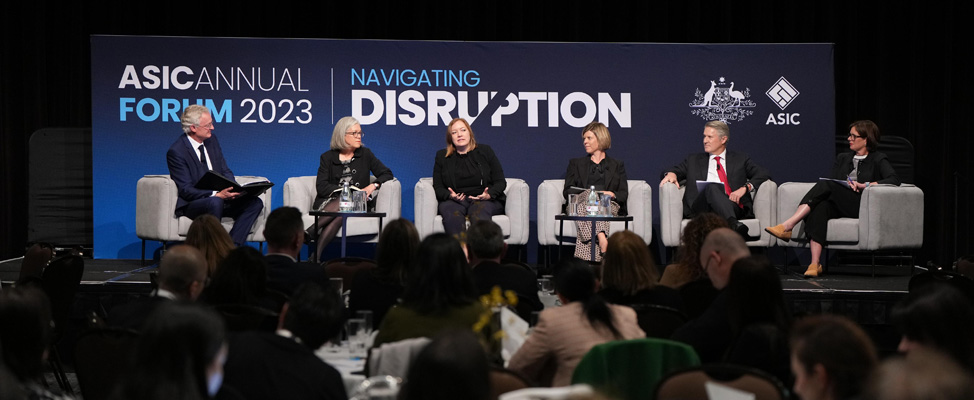Key points
- This article follows a session on the impacts of the net-zero economy on Australian businesses at the 2023 ASIC Annual Forum (AAF) in Melbourne.
- The Australian Government is consulting on a new mandatory climate-related reporting regime – representing a gear-change for industry and regulators alike.
- Supporting effective climate and sustainability governance and disclosure, as well as tackling greenwashing, are priorities for ASIC.

Karen Chester, Emma Herd, Kristy Graham, Kate Griffiths and Mark Rigotti speaking during the 2023 ASIC Annual Forum.
The drive towards decarbonisation is transforming markets the world over. By latest estimates, around 90% of global GDP is covered by a national net zero target at or around mid-century.
Ensuring businesses are delivering on these targets requires new levels of transparency – based on meaningful, internationally comparable metrics. This will result in the most substantial changes to corporate reporting in decades.
As part of its broader sustainable finance agenda, the Government is consulting on a mandatory disclosure regime for Australian large businesses and financial institutions – aligned to the standards set out by the International Sustainability Standards Board.
At the ASIC Annual Forum on Tuesday, experts considered whether industry is ready for the changes – and discussed the steps companies and directors should be taking now.
Kristy Graham, CEO of the Australian Sustainable Finance Institute said that voluntary climate disclosures were already happening in many areas. The reason, she said, is “because they provide a really valuable and useful framework to think through both the risks and the opportunities that are financially material to a particular company.”
“What mandatory reporting will do is increase the credibility, the coverage and the quality of that information and therefore enable financial institutions, allocators of capital, to use that information in the way they’re making those capital allocation decisions.”
“It just matters so much to the economy,” said ASIC Deputy Chair Karen Chester. “Because the decarbonisation transition journey that lays ahead is probably the single biggest driver today and for the foreseeable future of global capital. If we don’t get the disclosure standards right, a lot of that will be at risk.”
Mark Rigotti, Managing Director and CEO of the AICD, said companies and their directors should be looking at their governance structures, asking themselves whether they’ve done a baseline stocktake and trying to promote a culture of challenge.
ASIC has been clear on the need for industry to embed robust ESG practices sooner rather than later.
The planned disclosure regime would require companies to have advanced systems and processes in place to collect and analyse data across their own operations – and those of their supply chains.
However, while this represents a substantial change in practices, climate disclosure is just one part of a much broader shift in the economy towards sustainable finance.
The ESG space is complex and changing – industry (along with regulators) will need to build their capabilities in an environment where the bar is continually being raised.
To stay abreast of new developments, ASIC continues to engage with domestic and international peers, including through the Council of Financial Regulators Climate Working Group (alongside APRA, the RBA, and Treasury) and the International Organization of Securities Commissions’ Sustainable Finance Taskforce. We’re also working closely with Treasury as the Government’s sustainable finance agenda unfolds.
ASIC’s role was “long-standing and evolving,” said Ms Chester. “ASIC really started the drive toward climate-related financial disclosure about five years ago.” She said ASIC had encouraged listed entities to consider voluntarily disclosure – and that was “very successful” with around 75% of ASX 100 companies now reporting on that basis.
“We will help people correct. We’ll do it proportionately. But when needed, we will be an agent of enforcement.”
Background
The ASIC Annual Forum brings together thought leaders and experts to explore strategies for adapting and evolving in a time of geopolitical, economic and technological change. The theme of this year’s event is ‘Navigating Disruption’.
The session, ‘Responding to climate disruption’ was moderated by Tony Boyd, veteran business journalist.
The panel included:
- Karen Chester, Deputy Chair, ASIC
- Emma Herd, Partner, Climate Change and Sustainability Services, Ernst & Young
- Kristy Graham, CEO, Australian Sustainable Finance Institute
- Kate Griffiths, Executive Manager, Research and Policy, Australian Council of Superannuation Investors
- Mark Rigotti, Managing Director and CEO, AICD